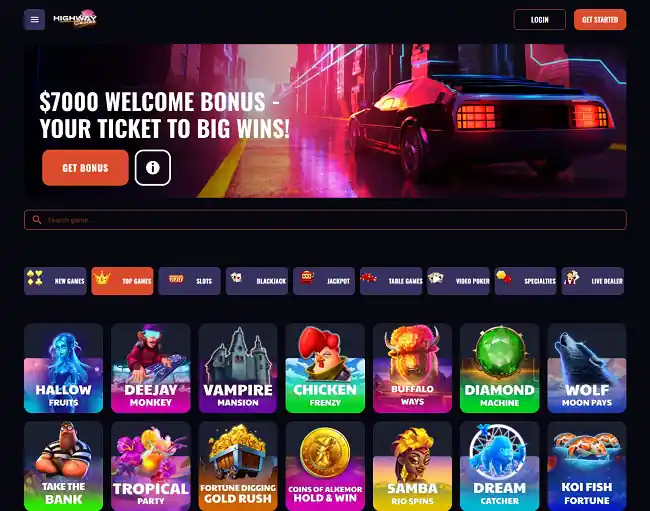Michigan Targets Online Gaming Sites: 11 + 13 = 24

The Michigan Gaming Control Board (MGCB) is at it again – seeking to protect its honest and upright citizens from the depredations of big, bad, scary offshore gaming sites. In a press release dated April 3, the Board announced that it had sent cease-and-desist letters to 11 operators of what it deems to be illegal online gambling websites. Then on April 9, the Board revealed that it had sent a further 13 letters of a similar nature.

About the Targeted Sites

The list of sites targeted includes some prominent names as well as a few more obscure entities. Among the most well-known of the affected firms are Las Atlantis Casino, Ruby Slots Casino, Ducky Luck Casino, Red Dog Casino, and Highway Casino. The others are:
- Shazam Casino
- SlotsRoom
- Bet Big Dollar Casino
- Blood Moon Casino
- Spinfinity
- Jumba Bet Casino
- Grand Eagle Online Casino
- DogsFortune
- Captain Jack Casino
- Casino Brango
- El Royale Casino
- Jazz Casino
- Jazz Sports Casino Racebook
- Looselines
- Planet 7 Casino
- Royal Oak Casino
- Silver Oak Casino
- Skybook
- Slots of Vegas
All of them offer casino games, like slots and blackjack, while a few of them additionally host sports and racetrack betting. Only a single one the affected casinos (Jazz Casino) operates a peer-to-peer online poker room. A look at the game library of Highway Casino gives us an idea of the offerings of these organizations:
 Highway Casino Game Lobby
Highway Casino Game LobbyHere we can see a “$7,000 Welcome Bonus” being advertised via a banner with a list of top games below. Many of the games are slots, which is to be expected as these types of diversions are very popular. Other categories of games are visible, like “table games” and “video poker.”
The authorities are giving these sites 14 days to stop serving Michigan customers. A failure to comply means that the Michigan Gaming Control Board will pursue legal remedies in conjunction with the Michigan Attorney General's Office.
What Did These Companies Do Wrong?

According to information provided by the MGCB, these organizations are offering online gambling services in the State of Michigan without possessing the needed licenses. Thus, they are allegedly breaking a variety of laws, including the Michigan Gaming Control and Revenue Act, the Lawful Internet Gaming Act, and the Michigan Penal Code.
Besides delineating what it believes is legal or illegal, the MCGB also commented on the supposed business practices of these firms although it did not accuse particular companies of specific misdeeds. Nevertheless, the Board stated that “these platforms engage in deceptive practices, including withholding winnings and imposing excessive wagering requirements” and that they “[leave] users vulnerable to fraud, identity theft, and other financial dangers.”
Are the Allegations True?
It's difficult to definitively refute the MGCB's contention that offshore gaming providers utilize unethical business practices especially because it did not give any concrete examples. Nevertheless, we can look at the kinds of misdeeds the Board highlights and see if they're prevalent in the industry.
Among the shady tactics denounced in the MGCB's April 9 press release is “restricting withdrawals.” It's true that there are any number of conditions that would cause an offshore gaming company to restrict withdrawals, such as if the user's deposit hasn't yet cleared, if they have not successfully completed ID verification, or if they have not fulfilled the wagering requirements of a bonus. But these same restrictions are in place at state-regulated online sports betting, casino, and poker operators, so they're not exclusive to the offshore market.
It's a similar case with “excessive wagering requirements,” which the MGCB cited as a deceptive practice in its April 3 announcement. Almost all internet gambling bonuses require a wagering requirement, or rollover, before any withdrawals are permitted. This is a standard practice intended to combat bonus hunters who otherwise would claim every free-money bonus under the sun without playing at all. Michigan-licensed online gaming firms certainly do have wagering requirements attached to their bonuses although they presumably aren't “excessive” in the eyes of the MGCB.
However, as we noted in our recent examination of new rules in the U.K. regulated internet gambling market, what counts as “excessive” wagering requirements lies in the eye of the beholder. Wagering totals that might seem prohibitively high to some would have others forming a line to take advantage of the bonus. Unfortunately, without any real-life examples from the MGCB, we cannot say whether or not any single bonus has wagering requirements that are excessive.
MGCB on a Tear Lately

The recent letters sent to a total of 24 gaming providers aren't the first sent by Michigan by any means. In fact, the MGCB has now sent a total of 52 such cease-and-desist letters to online gambling organizations in 2025 alone.
For instance, on Feb. 12, 2025, the MGCB shared the news that it had sent letters to nine firms, including BetDSI and XBet. It followed up on March 5 with letters to five more internet gaming companies.
Regarding the latest round of letters, MGCB Executive Director Henry William stated:
Our priority is to maintain a secure and regulated gaming environment. These websites not only violate Michigan’s laws but also engage in deceptive practices that endanger consumers, including withholding winnings and imposing unfair wagering requirements.
Many Reputable Online Gaming Sites Still Available

Despite the fervent efforts of the MGCB, there still remain many trustworthy internet gaming providers who are willing and able to serve Michigan's residents. Perhaps the most renowned of them is Ignition Casino, which hosts traditional casino games along with a multiplayer poker room. Make your first deposit with crypto-currency, and you'll get a 150% up to $1,500 poker bonus and an equal bonus for use in the casino.
Click the button below to begin your Ignition Casino adventure:
To learn more about Ignition first, check out this detailed Ignition Casino review. For other MI online poker options, read this guide to Michigan online poker. If you reside elsewhere in the United States, then this overview of USA offshore poker may prove beneficial to you.
